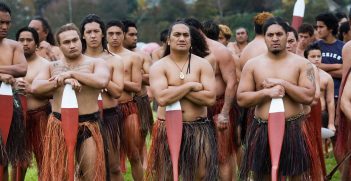Australia’s Challenge in Addressing its Trade Involving Forced Labor

International efforts to address human rights abuses against Uyghur Muslims in China’s Xinjiang region include targeted sanctions and legislative measures. Despite challenges, such as enforcement difficulties, the issue underscores the need for coordinated international action to balance economic interests with human rights concerns.
In August 2022, the United Nations’ Human Rights Committee issued a report delineating wide-spread human rights abuses including mass arbitrary detention, torture, cultural persecution, and forced labor of Uyghurs in Xinjiang China. China denies the accusations. The European Union (EU), United Kingdom (UK), Canada, and the United States (US) have labelled the abuse as “genocide.” The Australian Government has been considering legislative responses. Human Rights Watch’s assessment of the Uyghur issue noted that states, businesses, and the international community need to act with a view to ending the abuses and advancing justice and accountability. It suggested:
Australia should impose targeted sanctions against Chinese government officials who are implicated in crimes against humanity and other grave abuses against Uyghurs and other Turkic Muslims in Xinjiang…. The European Union, US, UK, and Canada have already taken these steps, and Australia should join these efforts to hold those responsible for these abuses accountable and to stand with victims. In a coordinated effort in March 2021, the European Union, UK, US, and Canada imposed targeted sanctions, including travel bans and asset freezes, on senior officials in Xinjiang who have been accused of serious human rights violations against Uyghur Muslims.
China’s Xinjiang Uyghur Autonomous Region (UXAR) is infamous for the Chinese Government’s reputed exploitation of the Uyghur population. Over China’s denials, UN and Western studies reveal widespread attempts at eradication of the Uyghur’s ethnic origins and the imprisonment, forced labour, and trafficking of their people to work for China’s profits in the world markets. International treaties, International Labour Organization (ILO) Conventions, and some foreign laws have attempted to push China into adherence to international labor and human rights standards against forced labour and trafficking. China has recently ratified ILO Conventions against forced labour and there is a pending, unsigned draft of an EU-China bilateral investment treaty incorporating those conventions (Comprehensive Agreement on Investment).
Treaties and ILO Conventions have frail enforcement powers and the issues have persisted. In 2022, the US enacted a new law, the Uyghur Forced Labor Prevention Act (UFLPA), using a new approach, going beyond traditional diplomacy and international standards, and indirectly inhibiting the practices by going after the money flowing from the exported trade of Uyghur-produced goods and prohibiting their importation into the US. The design is to increase the pressure on China to change, and present China with the consequences of its practices in terms of lost revenue. The mechanism of this law may provide a model for other countries to stop the direct and indirect flow of Uyghur-produced goods into their countries. This new law prohibits direct and third-country imports of the commerce of Uyghur-produced goods.
The US approach describes a legislative attempt to go beyond diplomatic cajoling to extract economic costs for China to continue this form of cheap labor. The economics of using forced labor is to cut labor costs and increase sales and profits. Reports show that it is not only China that reaps the benefits of these illicit profits, but also the many international companies doing business with the products coming from Xinjiang.
Some Western countries are addressing the trade in forced labour-produced products, including Canada, the UK, the EU, and the US: Canada also prohibits the imports of goods produced wholly or in part by forced labour, and in January 2021 announced intensified efforts to prevent businesses from being complicit in, or profiting from, human rights violations in the Xinjiang region. The UK has introduced measures that include guidance to companies dealing with Xinjiang and provides fines for companies failing to determine human rights abuses. It is reported that the EU, UK, and the US in a coordinated effort in March 2021, imposed sanctions on senior officials in Xinjiang who have been accused of serious human rights violations against Uyghur Muslims. In the UK, due diligence must be attempted to discover whether human rights abuses occurred, and the government must prove they failed to do so, unlike in US law where the companies have the burden of rebutting the presumption of violation of illegal dealings of dealing with imported Uyghur-made goods.
The EU approach for trading companies has been to use “due diligence,” with the ultimate burden of proving a violation on the government. On 23 April, 2024, the European Parliament approved rules to ban in the EU single market the sale, import, and export of goods made using forced labour. “The move was driven by EU lawmakers concerned about human rights in the Chinese region of Xinjiang.” It still needs approval from EU countries to enter into force. EU countries will start applying the law within three years.” Decisions to investigate will be based on factual and verifiable information that can be received from, for example, international organisations, cooperating authorities, and whistle-blowers.
In the US, UFLPA compliance requires that companies complete due diligence on identified high-risk materials entering the US market, like cotton and polysilicon, to prove they are not sourced from the XUAR. The UFLPA establishes a rebuttable presumption that “the importation of any goods” coming in from XUAR or produced by certain entities, is prohibited by Section 307 of the Tariff Act of 1930.” And the UFLPA Statistics Dashboard provides detailed and helpful information on its enforcement. But even with a strong ban against forced labour, enforcement challenges remain, with new allegations that companies are using corrupt social auditing and certifications to bypass requirements.
The Australian Government failed to pass a ban on the importation of Uyghur goods, but the Senate did pass a general ban bill; however, for the measure to come into effect it must also pass the government-controlled lower house, which it hasn’t. Also, there is the 2018 Modern Slavery Act that could be used to regulate labour-abuse imports and possibly be fitted to the Uyghurs, but it requires companies to only submit annual statements on measures taken to address modern slavery in their supply chains and operations, and further, it covers only companies with annual revenue of more than AUD$100 million. Some, opposed to the recently proposed Australian labour-abuse law passed by the Senate, preferred not to target China, and instead looked to other means to address the “Uyghur issue,” such as the 2021-passed law (similar to the Magnitsky law in the US) that provides for sanctions on those responsible for serious human rights violations and abuses, wherever they occur in the world.
Sum: Challenges, Confrontation with China?
“Over the four years of the brutal crackdown in Xinjiang, Australia’s two-way trade with Xinjiang increased by 150 per cent. The vast majority of that trade, about 73 per cent, is the import of goods from Xinjiang into Australia, with imports increasing by 150 per cent in 2009 and amounting to $37 million.” Country differences on how to approach forced labour abuses in trade, of course, need to be resolved politically. But toward what end – to halt it, to ignore it, to recognise the problem, to yield to economic interests, or to continue with diplomatic pressure without practical consequences to those benefiting from forced labour? That is the challenge for Australia.
Ronald C. Brown is Professor Emeritus University of Hawaii Law School. His teaching and research specialties include labor and employment law, employment discrimination law, arbitration, Chinese law, Asian International and Comparative Labor Law, and U.S.-China Labor & Employment Law.
This article is published under a Creative Commons License and may be republished with attribution.





